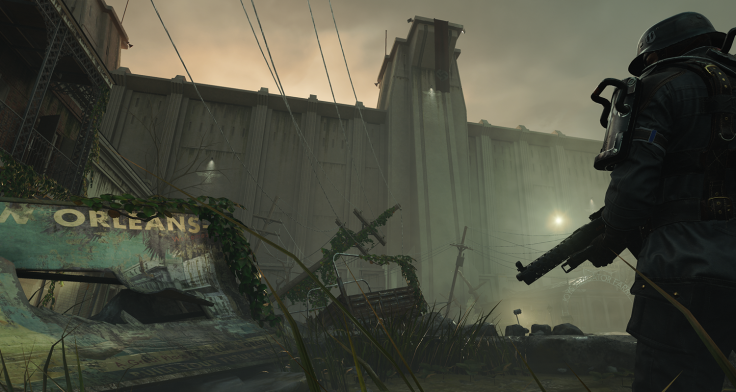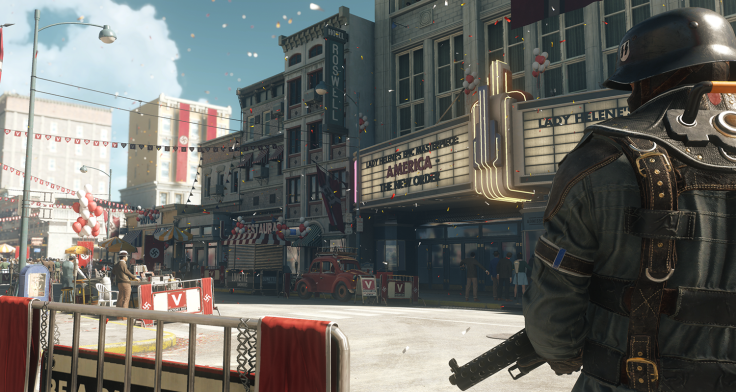Wolfenstein 2 interview: MachineGames co-founder on the return of B.J. Blazkowicz
Jens Matthies on B.J. Blazkowicz, Nazi-occupied America and options for a peaceful dialogue (there are none).
Slaughtering Nazis never gets old, and Wolfenstein has revelled in that purest of joys for 36 years. Three years ago the pioneering first-person shooter series enjoyed a resurgence thanks to the stellar work of developer MachineGames.
In 2014 nobody expected much from the Wolfenstein series, and so The New Order swept many players off their feet with a shooter that was modern in its approach – but also felt decidedly old school.
At E3 in June, publisher Bethesda announced hotly anticipated follow-up The New Colossus, revealing a game set in 1960s US that surrendered to the overwhelming might of Nazi Germany in this over-the-top alternate history.
Following our hands-on session with a previously-unseen level set in Roswell, New Mexico (you can guess what it involves), we sat down with the game's director and MachineGames co-founder Jens Matthies to discuss the project.
How will New Colossus differ from New Order?
The game is a direct sequel from the first game, so exactly where the first game ended is where this one picks up. It's fundamentally different in the sense that it's the continuation of the journey of B.J. Blazkowicz in this world, right? But I think more or less everything has changed because we completely changed engines, so the first game was id Tech 5, and now we're on id Tech 6, and so all of the art pipelines, all of the animation, the combat has been rebuilt from the ground up... the AI has been rebuilt too.
So, it's... I guess on all levels it is completely new, but at the same time, of course, we are maintaining what we think the Wolfenstein gameplay is, all those things, the characters and so forth.
What about the first game did you want to improve with the sequel, what did you want to build on?
I'm not so sure that there was anything big. We were really happy with the first game. It was incredibly close to what we set out to do when we started it. So, I think, the things we are improving are not on so much on a conceptual level, it's more of a technical level. The first game, for example, if you look down you couldn't see your body, you were just these floating guns basically, but now we have a full body. The goal is always to make the combat and the first-person experience to be as immersive and as powerful as possible, and the way that we saw that we could take that forward was to introduce a full-body model and all of the things that that allows you to do. Like, in terms of immersion, where we're just been layering a lot upon that.
For example, in this game, often, grenade explosions close to you will push you to the ground, and while you're on the ground you can still shoot, and aim, and look around, and get up, and do all of these things. So, it's more about refining stuff.

Another thing for example, was to create a greater gameplay difference between the two timelines. Wherein the first game it was mainly a story difference, there was some gameplay stuff, but primarily it was about story. In this game we have two completely different signature weapons depending on the timeline shift. You're playing the Fergus timeline, you have the LaserKraftWerk, which is from the first game, but if you play the Wyatt timeline, you have what's often called the DieselKraftWerk, which operates in an entirely different way, and gives you different kinds of gameplay opportunities and stuff.
So, things like that, it's sort of on that level, but fundamentally we felt very good about where the first game ended up, and that's sort of the wheelhouse that we want to be in for this one.
B.J. was one of the least likely video game protagonists to be given the kind of character development that you gave him in the first game. What's he going to go through in New Colossus?
It's very cool working with B.J., because in this game he starts off with this incredibly horrifying injury. So he goes from basically this Rambo-like character that is a very powerful physical presence, into someone who's really suffering out these injuries and can't even stand up anymore. So he has a personal journey in that sense, but on a bigger level, we are also going to the US, which is his homeland. It's now been taken over by his mortal enemies, so that gives us a lot of opportunities to explore... to get more intimate with B.J., and explore some things that no other Wolfenstein game has explored before.
What inspired you to set the game in a Nazi-occupied America?
When we were at id Software talking to them about possibly doing a Wolfenstein game we brainstormed this idea, 'Well, if the Nazis do take over the world,' because every previous Wolfenstein game was always during World War 2. So they took over the world, and they have this amazing technology and we're, kind of, now in this retro sci-fi 1960s, which we thought was super-powerful.
We started thinking about what the cultural implications of that was, because of course, in the 1960s there was a very big cultural revolution in the US that, sort of, spread throughout the whole western civilisation. [It was about] civil liberties, and personal freedom, there was Woodstock, and The Beatles and all of these things, right? So it's very interesting if that decade is suddenly happening under Nazi rule, what does that mean culturally? And so already back then before we even started making the first one, we were thinking about what would America look like in this world? America being this country that is literally founded on the idea of freedom, is now under occupation by the Nazis, right? And you have all of this Americana and all of these very, very iconic visuals, that are now suddenly subverted by Nazi ideology.
So we were really enthusiastic about putting that into the game, but what we realised was that project is so big it can't just be a level, the whole game has to be about that. So that was something we consciously saved in case we got to do a sequel, which fortunately we got to do. So, that was the genesis, I would say.

Wolfenstein and Doom have this shared history with id Software games and both enjoyed revivals in recent years published by Bethesda. How have you worked with id over the years, and did they come to you during the development of Doom after The New Order's success?
All of the studios within Bethesda are in communication with each other all the time. We test each other's games, give feedback, that kind of stuff. But we have an especially close relationship with id because not only are we working on their IP and their engine, but our programmers are essentially co-developers of the engine, so everything that we do to benefit our game can benefit their game. And everything they do to benefit their game, can benefit our game. So, that's very productive.
We talk to them all the time and of course, in the very beginning, it was important for us to make sure that whatever we do to the game has their blessing, because they are our heroes. I wouldn't be in the industry if it wasn't for Quake and its modding scene. That's how I built my portfolio and got into the industry. People like Tim Willits and Kevin Cloud, those were my heroes growing up, you know? So, we never had any interest in making a game they wouldn't approve of. But now we're at the point where now they trust that we know what we're doing. We get along very well with them.
Cool, one last question...
Sure.
Is there an option to open a peaceful dialogue with the Nazis?
[Laughs] No.
Good.
© Copyright IBTimes 2024. All rights reserved.






